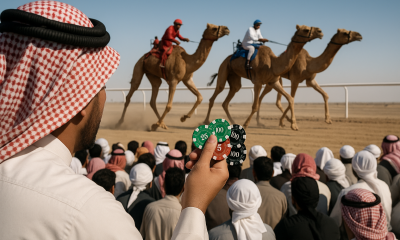around the world
The Cultural Impact of India’s Matka Gambling

Matka was one of the largest gambling ventures in India in the 90s, but the widespread links to illegal dens and dealers saw the game become outlawed in India. At its base, matka is a lottery game, involving betting on random number draws, and is quite unique in itself. Played using matka potware, where number lots are drawn from, it is a far cry from the original version of this game.
Because, originally, Matka was actually played by cotton mill workers, and they bet on the closing and opening rates of the cotton. Normally, that wouldn’t be something you would gamble on. Or at best, it resembles Forex trading or stock market betting. But in the 1960s, cotton was one of the fastest growing industries in post-independence India. Matka caught on like wildfire among the local workers, and was seen as a low-stakes game of chance that could occasionally bring a neat little pot, or “matka” or cash.
Origins of Indian Matka Gambling
India has been a prominent player in the textile industry for a good 250+ years. Back in the middle of the 18th century, India produced around 25% of the world’s output. Even then, their cotton textiles and manufactured goods were sent all over the world, from Japan to the Americas. And as the East Indian Company grew, so did India’s cotton manufacturing.
The exact moment when Matka was invented is not known, but we do know that it became part of the Indian gambling tradition in the late 1950s. The game revolved around props bets on the prices of cotton. These were sent via teleprinters from the New York Cotton Exchange to the Bombay Cotton Exchange. And punters would bet on the opening and closing rates of the cotton. It was a practice mostly done by working class labourers, especially those working in the booming textile industry of India. But in 1961, the NY Cotton Exchange stopped the practice. So punters were forced to come up with an alternative to keep Matka going.
Many variants came in the next few years. Some involved drawing playing cards, while others retained the cotton price angle, using imaginary rates pulled from a matka, or clay pot. The games converged and developed into the modern game of Matka, with the standardised “draw 3+1 numbers” method.

Matka Goes Underground
The bookies opened up shop around the mills and textile manufacturing units, where matka had already carved itself into the local culture. By the 1980s and 90s, Matka reached an all time high. It was estimated that by 1995, there were over 2,000 bigger bookmakers in Mumbai. Now gambling was, and still remains, a highly contentious activity in India and one that has vague legislation to say the least. The 1867 Public Gambling Act prohibited the operation or management of public gambling establishments. Though the definition of gambling had not been clearly defined.
As Matka grew, the problem of unregulated operators and vast sums of money exchanging hands, the government decided to crack down on Matka. Of the 2,000+ bookmakers in Mumbai, the majority were forced to shut down shop or move. Fewer than 300 remained, and had to go underground or abroad.
Each region and province in India has its own gambling laws and regulations, though for the most part, Matka is considered illegal. There have been some notions, such as in 2015, when lawmakers looked at a potential notion to legalise Matka. Because the underground matka scene is still pretty extensive, despite being technically illegal. But up til now, there has been no serious progress as far as legalisation is concerned.
Rules of Modern Matka
No playing cards or fake exchange rates here. The standardised version of Matka is more like an alternative type of lottery game. Most Matka bookmakers run games twice a day, called the Opening draw and the Closing draw. A Satta Matka draw comprises 8 numbers, 4 of which are in the opening draw, and 4 in the closing.
Of the four numbers, 3 are randomly selected (patti numbers), and the fourth (ank number) is calculated by taking the sum of the three initial numbers, and taking the second digit of the concluding sum. For example, the patti numbers are 4, 5 and 7. The ank will be 6, taken from the second digit of 16.

Matka Common Bets
The results will be displayed linearly, in the following way:
134-84-257
- 134-8: Opening draw
- 134: Opening draw patti
- 8: Opening draw ank
- 4-257: Closing draw
- 257: Closing draw patti
- 4: Closing draw ank
You can place all kinds of bets on the Matka draw. These can relate to the fourth numbers, initial numbers (or Patti numbers as they can be called.
- Single/Ank – A bet on one Ank number
- Jodi/Pair – Bet on the pair of Ank numbers
- Patti/Panna – Bet on patti numbers. Though you can have patti bets with two of the same number, called double patti (for example, 113) or a triple patti on all three numbers being the same (222)
- Half Sangam/Full Sangam – In Half Sangam, you bet on both the patti and ank numbers, for either the opening or closing draw. A full Sangam has you bet on pattis and anks in both draws.
It may sound a little complex, but you can get the hang of it after a few tries. Matka is quite a simple game, which is probably why it became so widespread and effective.
The odds will vary depending on the bet, with Ank bets having the lowest odds, and the Full Sangam providing you with the longest odds. Of course, you can diversify and place numerous bets on the same draw, but bear in mind that there is a house edge in the game.
Who Were the Matka Kings
The Matka Kings were the business merchants who popularised and made Matka what it is today. Ratan Khatri, one of the most famous businessmen, was the original Matka king. He formalised the game and created the modern game, with two daily draws and fixed payout ratios.
His influence was significant in the world of Matka, and he became an icon of Mumbai’s underworld culture. Another key figure, or King, was Kalyanji Bhagat, who created a huge empire of Matka games, employing thousands of people. These Kings weren’t criminals. In fact, a lot of locals saw them as patrons and made men. But when Mumbai closed in on Matka, their operations shrank, and they were forced to change their businesses. But both men live on in Matka legend.
Cultural Influence of Matka
Matka isn’t just a gambling game or an Indian lottery. The game has influenced film, media, music and even street slang. The bets, Ank, Jodi or Cut have found their way into urban slang. And Matka has even found its way onto the silver screen, with several Bollywood films referencing the Matka Kings or the games. There even was a movie, Dharmatma, based on the life of Matka King Ratan Khatri.

Misconceptions About Lottery Odds and Chances of Winning
The game itself, while technically illegal, is still quite popular in India. Though instead of random draws from pots or other clever lotto techniques, the modern games often use RNGs to generate fair outcomes. While the technology has developed, the betting traditions around Matka are still tied to many of the same roots as they were in the past. Lucky numbers, symbolic tidings and the belief that people can predict the Matka results are still quite common. Of course, every draw is completely random, but, just like lottery players, some Matka gamers erroneously think they can beat the house.
Matka operators usually provide historical data and results sheets through which you can read the previous results. And some gamers make the mistake of believing that they can predict future draws by locating patterns or finding numbers that are due a win. Of course, each draw is a completely isolated event and not influenced by any of the previous draws.
Where You Can Play Matka Today
We mentioned Matka is illegal a few times, but also said that you can find this game in India. It is a bit of a grey area, as bookmakers aren’t technically allowed to host these games, but there are no rules against Indian players trying their luck at Matka games. A lot of the bookmakers have gone underground, and some have gone online. There are Indian online casinos and Matka rooms where you can find games of Matka, mimicking the standardised version of the game. But instead of using draws, they are powered by algorithms that use RNGs to make each result completely random.
The Indian government could only benefit from legalising Matka. Or should we say, legitimising the already present market, and creating a fair standard for Indian gamers. As of right now, there have been no major movements, only a few quiet calls. So right now, the best Matka can be found online at reputable game vendors who operate outside India. Of course, some local bookmakers supply traditional Matka. But you should always be wary that in an unregulated market, there are no assurances that the bookmaker won’t scam you. So be careful to only pick a licensed and reputable operator for a fair and safe gaming environment.











